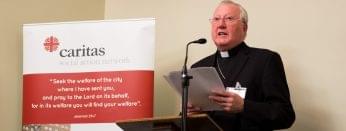Sign Up for Lent
The Season of Lent in the liturgical calendar begins on Ash Wednesday (22 February) and ends with the Mass of the Lord’s Supper (6 April). In English, the word Lent has its roots in the Old English word lencten, meaning springtime, the lengthening of days, the coming of new life. In the life of the Church, Lent is a time of conversion and renewal, a time to be reconciled with God and our neighbour.
The Catechism reminds us of the importance of the three ‘pillars’ of Lent, that is prayer, fasting and almsgiving: “The interior penance of the Christian can be expressed in many ways. Scripture and the Fathers insist above all on three forms, fasting, prayer and almsgiving, which express conversion in relation to oneself, to God and to others” (1).
In the Cycles of Prayer for Lent we are invited to pray especially for those who are preparing for baptism, for the needy and hungry of the world. A key date is Friday 3 March, Women’s World Day of Prayer, which has its ecumenical roots in the nineteenth century, an initiative which Catholic women joined following the reforms of the Second Vatican Council. For more information visit: https://www.wwdp.org.uk/about-us/our-history/.
Fasting is an exercise of the virtue of temperance, when we pay particular attention to what we consume. In more recent times, following the publication of Laudato Si by Pope Francis, we can see fasting as an invitation to live more simply, to be attentive to the resources of the earth which we consume in our everyday lives and the circumstances of those who produced them.
Almsgiving also has deep roots in the Christian tradition. In St Luke’s gospel, Jesus tells his disciples, “sell your possessions, and give alms” (Luke 12:33). The point of this divestment of possessions is not to impoverish us, but so that we do not become attached to wealth, which is a kind of idolatry. In the early Church described by St Luke in the Acts of the Apostles, we see that when everyone sells their possessions for the sake of those in need, no one goes without: “All who believed were together and had all things in common, they would sell their possessions and goods and distribute the proceeds to all, as any had need” (Acts 2: 44-45).
Today, there are many calls on us to give alms. There are more people than ever in our communities being dragged into poverty by the cost-of-living emergency. Many people give alms to local foodbanks and food pantries, many others give the ‘alms’ of their time and talent to help with warm spaces and friendship hubs. We have the annual opportunity for the Catholic community to give alms on Lent Fast Day on Friday 3 March, with more details here: https://cafod.org.uk/fundraise/family-fast-day. There is also the urgent need for humanitarian assistance for those suffering in Turkey and Northern Syria following the earthquake. The link for the DEC appeal is here: https://www.dec.org.uk/appeal/turkey-syria-earthquake-appeal.
The brutal war in Ukraine continues with no prospect of peace in sight. Millions of families – mostly women and children – have been displaced by the fighting. We renew our invitation to the Catholic community to consider giving the ‘alms’ of a place to live to those who have no home because of the war. Our Homes for Ukraine matching service in partnership with St John of God Hospitaller Services currently has over 200 applications from Ukrainians waiting to be matched with a sponsor in the UK. For more information please visit: https://sjog-homesforukraine.uk/#:~:text=Our%20Homes%20for%20Ukraine%20project,find%20homes%20in%20the%20UK.
As Pope Francis has reminded us, for Christians it is not enough to give alms, we must also challenge injustice and work “to eliminate the structural causes of poverty” (EG, 188). At CSAN, part of our response to that exhortation is to invite the Catholic community to write to their MPs with specific ‘asks’ of the government to end poverty. You will find details of our letter writing campaign here: https://www.csan.org.uk/guidance/template-letter-to-your-mp/.
It was always customary in the Catholic tradition to ‘give things up’ for Lent, especially things which we enjoyed but weren’t necessarily good for us. This is an important dimension of fasting which in recent years has expanded into an intention to be more active in charity during Lent. Working for peace and justice is at the heart of Christian discipleship. We are called to do that according to our skills, temperament and condition in life. The main thing is that we Sign Up for Lent, consider some ways in which we can volunteer in our parish or diocesan Caritas to build a better world. For more information about the members of the CSAN network, please visit: https://www.csan.org.uk/member/. Please also check your own diocesan website for programmes or campaigns this Lent.
From all the trustees and staff at Caritas Social Action Network, we wish you a blessed and fruitful Lenten season. Thank you to all the staff and volunteers in our member charities and diocesan Caritas agencies for your inspiring work on the front line of poverty. You are ambassadors of hope and reconciliation.
Raymond Friel, CEO, Caritas Social Action Network February 2023
(1) Catechism of the Catholic Church, 1434
(2) Pope Francis, Evangelii Gaudium, 188
NOTES
More information on the Season of Lent can be found at: https://www.liturgyoffice.org.uk/Calendar/Seasons/Lent.pdf






